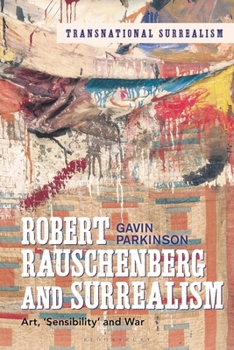Robert Rauschenberg and Surrealism: Art, 'Sensibility' and War
The art of Robert Rauschenberg (1925-2008) is usually viewed as quite distinct from Surrealism, a movement which the artist himself displayed some hostility towards. However, Rauschenberg had a very positive reception among Surrealists, particularly across the period 1959-69.
In the face of Rauschenberg's avowals of his own 'literalism' and insistence on his art as 'facts, ' this book gathers generous evidence of the poetic, metaphorical, allusive, associative and connotative dimensions of the artist's oeuvre as identified by Surrealists, and thus extrapolates new readings from Rauschenberg's key works on that basis. Setting Rauschenberg's work in a postwar context of US cultural imperialism, and the increasingly politicized activities of the Surrealists in the era of the Algerian War of Independence (1954-62), Parkinson draws fresh connections between the ethical and political dimensions of surrealism and the anti-war and anti-colonialist struggles of the time.





